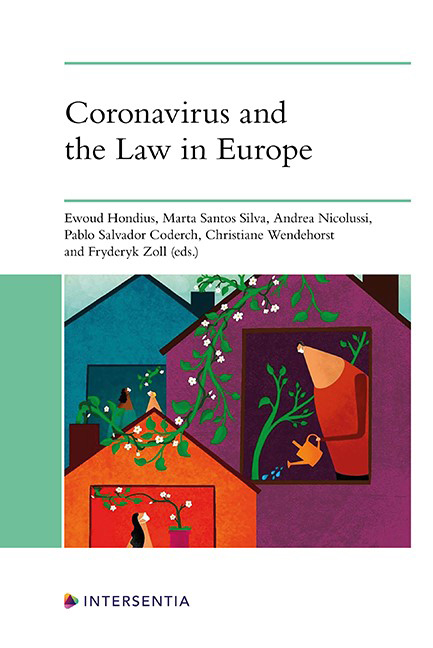Book contents
- Frontmatter
- Preface
- Contents
- List of Keywords
- List of Contributors
- PART I COVID-19 AND FUNDAMENTAL RIGHTS
- PART II STATES AGAINST THE PANDEMIC
- PART III COMPENSATION FOR COVID-19 RELATED DAMAGE
- PART IV CONTRACT LAW
- PART V CONSUMER LAW
- PART VI LABOUR AND SOCIAL LAW
- PART VII CORONAVIRUS CHANGING EUROPE
- Epilogue
- Annex: ELI Principles for the COVID-19 Crisis
- About the Editors
Coronavirus, the Millennium and the Financial Crisis
Published online by Cambridge University Press: 10 December 2021
- Frontmatter
- Preface
- Contents
- List of Keywords
- List of Contributors
- PART I COVID-19 AND FUNDAMENTAL RIGHTS
- PART II STATES AGAINST THE PANDEMIC
- PART III COMPENSATION FOR COVID-19 RELATED DAMAGE
- PART IV CONTRACT LAW
- PART V CONSUMER LAW
- PART VI LABOUR AND SOCIAL LAW
- PART VII CORONAVIRUS CHANGING EUROPE
- Epilogue
- Annex: ELI Principles for the COVID-19 Crisis
- About the Editors
Summary
Coronavirus may be a new issue, but epidemics are not. Legal issues related to epidemics are of all times. Two disasters which struck in recent times were the millennium bug and the financial crisis. This contribution deals with the question how Dutch law has coped with the Corona crisis. More in particular it addresses how the 1992 Civil Code’s new provision on unforeseen circumstances has been (non) applied in practice. The contribution then turns to two international developments: the work of the International Chamber of Commerce – see also the contribution by Denis Philippe in this volume – and the work of the Common Core of European Private Law (Trento) project.
INTRODUCTION
The coronavirus has all of us in its grips. Apart from medical and ethical questions, it raises legal and economic issues. Is the train passenger entitled to repayment of the fare when travel is suspended? Is there recourse for the air passenger who has been leftstranded at a Moroccan airport? May the small retailer call in force majeure or a hardship clause when he/she can no longer pay the rent? Is the Government empowered to commandeer medicine from unwilling pharmaceutical companies?
Coronavirus may be a new issue, but epidemics are not. Legal issues related to epidemics are also of all times. It therefore seems a good idea when trying to answer the questions to look back to the past. I do not have in mind a fullfledged historical survey of the pest or Spanish influenza or the Mexican flu. No doubt a systematic study of these disasters will be undertaken. What springs to one’s mind is a comparison with two more or less recent occurrences of a comparable nature.
The first occurrence is a problem which during the last millennium change raised wide-spread anxiety, and was known as the millennium-bug or Y2K. It refers to events related to the formatting and storage of calendar data for dates beginning in the year 2000. Problems were anticipated, and did arise, because many programmes represented four-digit years with only the final two digits – making the year 2000 indistinguishable from 1900. The assumption of a twentiethcentury date in such programmes could cause various errors, such as the incorrect display of dates and the inaccurate ordering of automated dated records or realtime events.
- Type
- Chapter
- Information
- Coronavirus and the Law in Europe , pp. 813 - 830Publisher: IntersentiaPrint publication year: 2021

